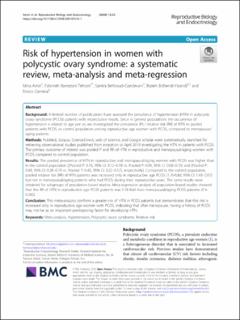Risk of hypertension in women with polycystic ovary syndrome: a systematic review, meta-analysis and meta-regression
Amiri, Mina; Ramezani Tehrani, Fahimeh; Behboudi Gandevani, Samira; Bidhendi-Yarandi, Razieh; Carmina, Enriko
Peer reviewed, Journal article
Published version

Åpne
Permanent lenke
https://hdl.handle.net/11250/2660857Utgivelsesdato
2020Metadata
Vis full innførselSamlinger
Originalversjon
Amiri, M., Tehrani, F. R., Behboudi-Gandevani, S., Bidhendi-Yarandi, R. & Carmina, E. (2020). Risk of hypertension in women with polycystic ovary syndrome: a systematic review, meta-analysis and meta-regression. Reproductive Biology and Endocrinology, 18: 23. doi: 10.1186/s12958-020-00576-1Sammendrag
Background: A limited number of publications have assessed the prevalence of hypertension (HTN) in polycystic ovary syndrome (PCOS) patients with inconclusive results. Since in general populations the occurrence of hypertension is related to age per se, we investigated the prevalence (P) / relative risk (RR) of HTN in pooled patients with PCOS, vs control population among reproductive age women with PCOS, compared to menopause/aging patients.
Methods: PubMed, Scopus, ScienceDirect, web of science, and Google scholar were systematically searched for retrieving observational studies published from inception to April 2019 investigating the HTN in patients with PCOS. The primary outcome of interest was pooled P and RR of HTN in reproductive and menopausal/aging women with PCOS compared to control population.
Results: The pooled prevalence of HTN in reproductive and menopausal/aging women with PCOS was higher than in the control population [(Pooled P: 0.15, 95% CI: 0.12–0.18 vs. Pooled P: 0.09, 95% CI: 0.08–0.10) and (Pooled P: 0.49, 95% CI: 0.28–0.70 vs. Pooled P: 0.40, 95% CI: 0.22–0.57), respectively]. Compared to the control population, pooled relative risk (RR) of HTN patients was increased only in reproductive age PCOS (1.70-fold, 95% CI: 1.43–2.07) but not in menopausal/aging patients who had PCOS during their reproductive years. The same results were obtained for subgroups of population-based studies. Meta-regression analysis of population-based studies showed that the RR of HTN in reproductive age PCOS patients was 1.76-fold than menopausal/aging PCOS patients (P = 0.262).
Conclusion: This meta-analysis confirms a greater risk of HTN in PCOS patients but demonstrates that this risk is increased only in reproductive age women with PCOS, indicating that after menopause, having a history of PCOS may not be as an important predisposing factor for developing HTN.
